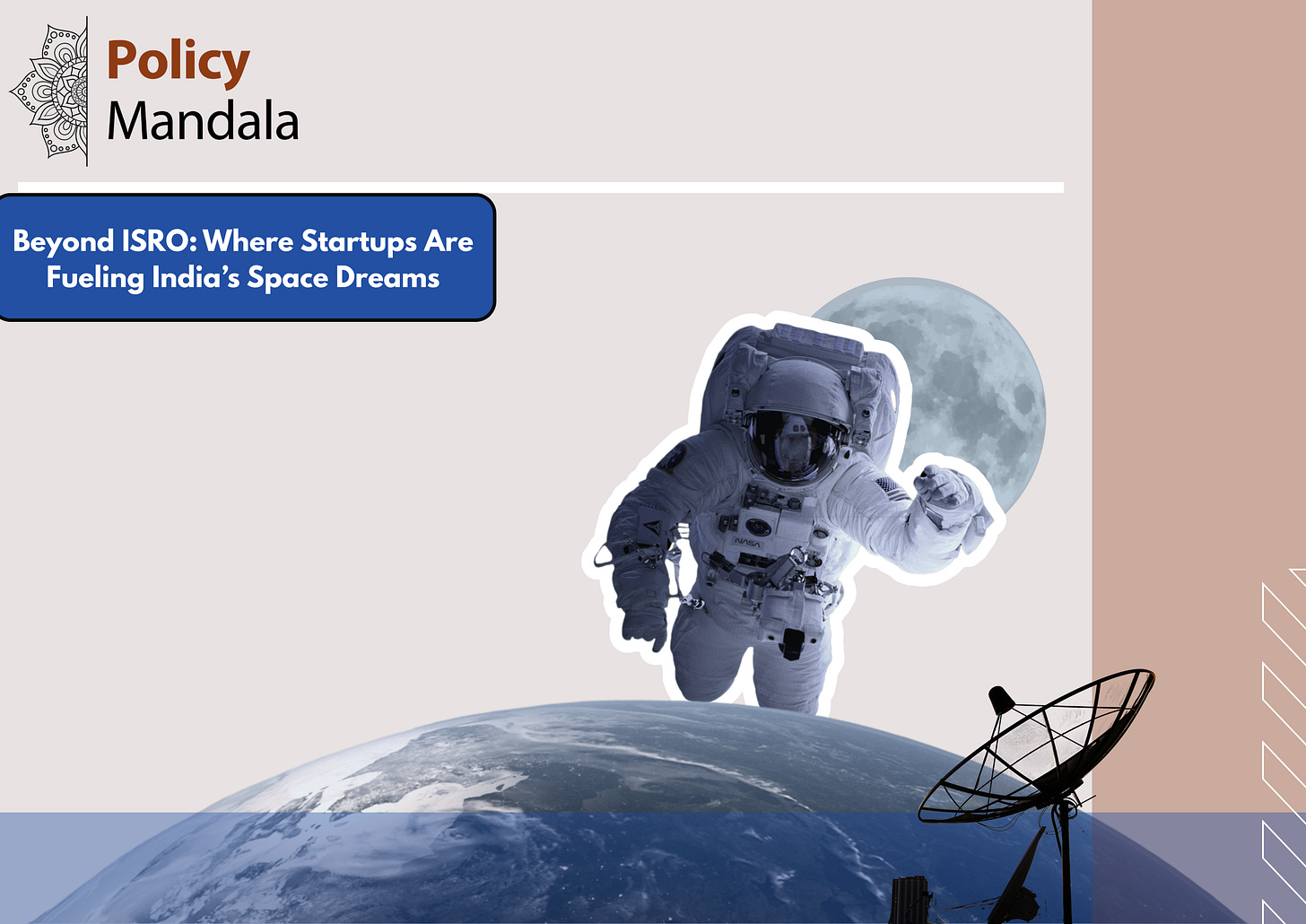#27 Beyond ISRO: Where Startups Are Fueling India’s Space Dreams
Welcome to the 27th edition of Policy Mandala by India House. This week, we explore India’s space startups—how they're scaling, what’s missing, and where they go next. Enjoy Reading!
In Rajkot, a teenage girl is sitting on her terrace, gazing at the deep blue night sky, tinkering with a small sensor in her hands. She dreams of building a satellite one day. The year is 2025.
Ten years ago, that would’ve sounded absurd. Today, it’s within reach.
India is now home to over 200 space-tech startups and a growing $8.4 billion space economy. The dream of space is no longer limited to rocket scientists or global tech giants. It belongs to everyone—from shopkeepers in Surat to farmers in Assam.
And we’re just getting started. India’s space economy is projected to grow to $44 billion by 2033. That translates to faster weather forecasts for a fisherman, smarter agriculture for a farmer, seamless mobile connectivity for a shopkeeper in the Himalayas, and real-time services for entrepreneurs delivered from satellites orbiting above.
No surprise then, that states like Gujarat and Tamil Nadu are entering the fray—with space policies of their own. While India’s national space policy was launched in 2023, these states are now building their own launchpads—literally and economically.
Let’s zoom in.
On April 17, Gujarat became the first Indian state to launch a dedicated SpaceTech Policy. The goal? Simple: attract private players. The state is planning a Space Manufacturing Park, a Centre of Excellence for research, and a suite of incentives to help startups build satellite components, develop communication systems, and innovate across the value chain.
Tamil Nadu followed quickly. On April 18, it launched its Space Industrial Policy 2025. The pitch is similar—support space-centric industries. But the approach is distinct. Tamil Nadu is setting up Space Bays in Madurai, Thoothukudi, Tirunelveli, and Virudhunagar, offering land, single-window clearances, and targeted subsidies. Think SEZs, but for space.
So what’s driving this momentum?
A big shift happened in 2020. India opened up the space sector to private participation. IN-SPACe—the Indian National Space Promotion and Authorization Centre—was created as the nodal body. FDI norms were liberalized, from earlier 0% to now ranging from 49% to 100% in various sectors.
This means foreign companies and Indian startups can now build, launch, and operate space systems from India—with access to ISRO’s infrastructure and fewer regulatory hurdles.
Suddenly, Indian startups could do what was once reserved only for ISRO!
And the numbers reflect it. From just 54 private firms in 2020, India now has over 200 in 2024.
This brings us back to Gujarat and Tamil Nadu.
Can these policies create new space-tech hubs beyond Bengaluru, Hyderabad, and Chennai?
Bengaluru, of course, leads—with major space agencies like ISRO HQ, URSC, ISTRAC, and startups like Pixxel and Bellatrix. Hyderabad and Chennai follow close behind, home to players like Dhruva Space and Agnikul Cosmos.
Gujarat has a steeper climb. But Tamil Nadu has some tailwinds: proximity to ISRO’s Propulsion Complex in Mahendragiri, the upcoming launchpad at Kulasekarapattinam, and an established industrial base with giants like L&T and LMW.
Execution will be key. Fortunately, both states are amongst the top five in ease of doing business rankings. With strong institutional networks, manufacturing ecosystems, and startup infrastructure, they are well placed to build momentum.
But let’s be clear: India has miles to go. The US has over 5,000 operational satellites. India? Around 60.
To close that gap, the government has launched a ₹1,000 crore space startup fund and backed it with execution muscle. IN-SPACe now runs a ₹500 crore Technology Adoption Fund—covering up to 60% of mission costs for startups, and providing grants of up to ₹25 crore along with technical mentoring.
The focus is sharp. India isn’t trying to do everything. It’s playing to its strengths:
Small satellite launches
Small satellite manufacturing
Ground stations
Data services
This isn’t just about rockets. It’s about climate resilience, precision farming, disaster response, and rural connectivity. Space-tech is no longer a curiosity. It’s becoming core infrastructure.
If Gujarat and Tamil Nadu succeed, they’ll not only create jobs. They’ll create belief.
Belief that space isn’t just for Silicon Valley or South Block. It’s for every young Indian with a soldering iron and a dream.
So the real question is: are we building space infrastructure—or are we building space imagination?
Can this girl from Rajkot be the next Elon or Somnath?
Only time will tell. But the countdown has begun.
Book Mandala
In this section, we suggest a book to be read/listened to each week, for the inner policy enthusiast in you :)
Book: Freakonomics
Author: Steven D. Levitt & Stephen J. Dubner
About the Book:
Freakonomics isn’t your typical economics book. Written by economist Steven Levitt and journalist Stephen Dubner, it takes big economic questions and applies them to everyday life—with surprising results. Why do sumo wrestlers cheat? Do real estate agents really act in your best interest? Why do drug dealers still live with their moms?
Told through six sharp, essay-style chapters, the book explores everything from crime and parenting to baby names and abortion policies. Originally published in 2013, Freakonomics shows that beneath the surface of daily life, there are hidden incentives, surprising truths, and unexpected patterns waiting to be uncovered.
Our Take:
What makes Freakonomics so compelling is not just its quirky questions, but the way it reorients your lens on the world. Levitt and Dubner show us that economics isn’t about money—it’s about how people respond to incentives. The book’s genius lies in its simplicity. There’s no jargon. No dense theory. Just sharp storytelling built on data and counterintuitive questions. Each answer reveals a hidden structure—an incentive that makes people do things that don’t seem logical at first glance.
At the same time, the book isn't perfect. It can sometimes oversimplify or risk causation where there’s only correlation. But its larger message holds: question your assumptions, follow the incentives, and trust the evidence over the anecdote.
If you’re interested in policy, governance, or social change, Freakonomics won’t give you answers. It’ll give you better questions.
Hope you liked today’s Policy Mandala!
We believe nation-building needs a community of changemakers—so we’re creating Bharat Mandala, an ecosystem for impact. Be part of our journey here!
Thanks for reading Policy Mandala! Subscribe for free to receive new posts and support our work.




